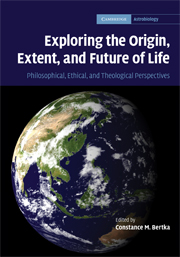 Exploring the Origin, Extent, and Future of Life
Exploring the Origin, Extent, and Future of Life Book contents
- Frontmatter
- Contents
- List of contributors
- Acknowledgements
- 1 Astrobiology in a societal context
- Part I Origin of life
- Part II Extent of life
- 7 A biologist's guide to the solar system
- 8 The quest for habitable worlds and life beyond the solar system
- 9 A historical perspective on the extent and search for life
- 10 The search for extraterrestrial life: epistemology, ethics, and worldviews
- 11 The implications of discovering extraterrestrial life: different searches, different issues
- 12 God, evolution, and astrobiology
- Part III Future of life
- Index
- References
12 - God, evolution, and astrobiology
from Part II - Extent of life
Published online by Cambridge University Press: 29 December 2010
- Frontmatter
- Contents
- List of contributors
- Acknowledgements
- 1 Astrobiology in a societal context
- Part I Origin of life
- Part II Extent of life
- 7 A biologist's guide to the solar system
- 8 The quest for habitable worlds and life beyond the solar system
- 9 A historical perspective on the extent and search for life
- 10 The search for extraterrestrial life: epistemology, ethics, and worldviews
- 11 The implications of discovering extraterrestrial life: different searches, different issues
- 12 God, evolution, and astrobiology
- Part III Future of life
- Index
- References
Summary
There is a Family Circle cartoon that shows the father of the family escorting his daughter home from school. The caption is a single question that the little girl asks of her father: “If we send astronauts to Mars, do they hafta drive past Heaven?” While this strikes us as funny, it illustrates the double world in which many of us live. Few educated adults would ask the question in such simplistic terms. Nevertheless, many people live in a bifurcated world in which they have accepted the results of science, and presume the reasonable world of scientific endeavor. However, when it comes to thinking about God, some people still have a somewhat childish, antiquated, or rudimentary worldview. In the scientific world everything is open to question and results are only as valid as the evidence that supports them. With regard to God, however, both believers and non-believers often assume that religious issues can only be settled by reverting to a kind of mythic fideism.
In the contemporary Christian world of North America, the notion that God might have created other worlds with novel emergent life forms can threaten this basic religious intuition. The Genesis accounts of creation presume that the Earth is central to God's purposes, most notably that of establishing a special relationship with mankind. The discovery of extraterrestrial life in any form would seem to contradict this core assumption of the Judeo-Christian tradition.
- Type
- Chapter
- Information
- Exploring the Origin, Extent, and Future of LifePhilosophical, Ethical and Theological Perspectives, pp. 220 - 242Publisher: Cambridge University PressPrint publication year: 2009
References
- 2
- Cited by


